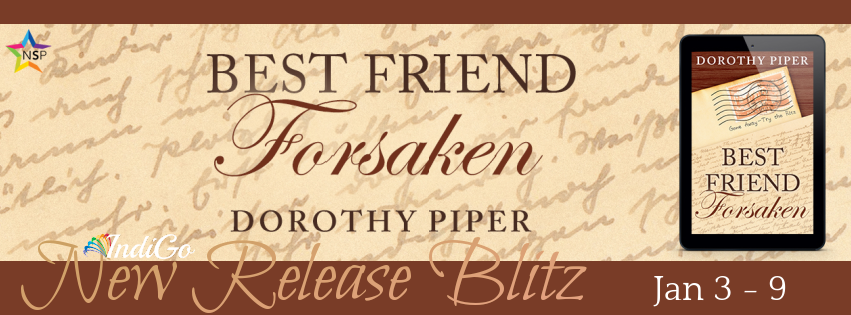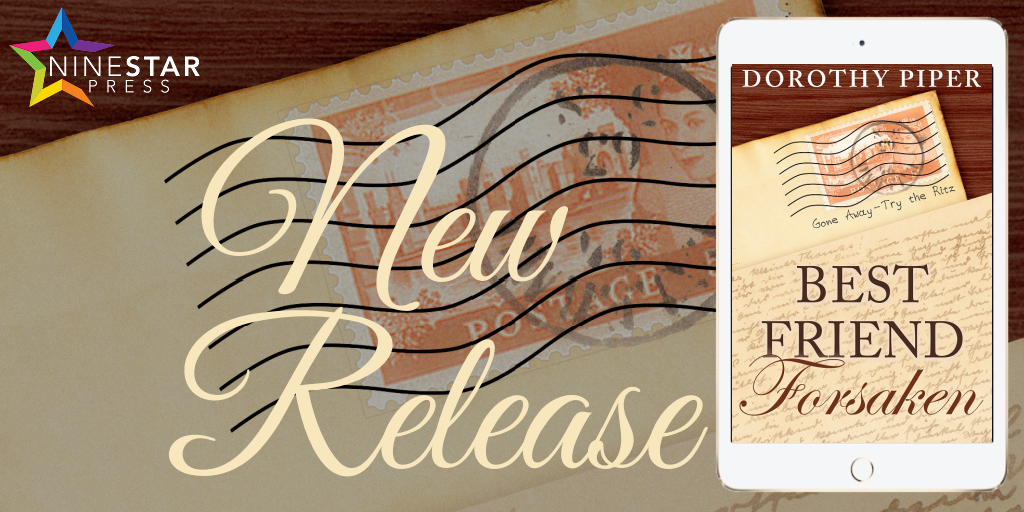
Title: Best Friend Forsaken
Author: Dorothy Piper
Publisher: NineStar Press
Release Date: 01/03/2023
Heat Level: 3 - Some Sex
Pairing: Male/Male
Length: 81000
Genre: Historical, LGBTQIA+, gay romance, history, friends to lovers, family drama, slow burn
Description
Ted and Bill, evacuated to Yorkshire during World War II, vow to be best friends the day they meet. When the war ends and they return to London, where Bill’s father dies, and Ted’s family take Bill into their home.
The boys’ friendship deepens into forbidden love. Henry, Ted’s father—who can’t abide homosexuality—throws Bill out of the house and forbids Ted to see or contact Bill again. The youths go their wildly different ways but defy Henry by secretly keeping in touch.
Two years later, during a distressing family gathering, Henry learns of their ongoing love affair. Furious and disgusted, he tells Ted “It’s him or me. Give him up or I disown you.” Ted chooses his lover, but Henry, determined to get his own way, goes to see Bill and lies to him, saying Ted has broken off the romance rather than be disowned. Henry is convincing, and Bill believes him. Heartbroken, Bill moves away and forsakes Ted.
Bitter and angry, Ted moves back to Yorkshire and throws himself into a job that leaves no time or energy to dwell on life without Bill.
A loveless future lies ahead for both young men unless Fate can intervene.
ExcerptBest Friend Forsaken
Dorothy Piper © 2023
All Rights Reserved
Chapter One
A sturdy urchin dug a trowel into a water-logged patch of soil, while a slimmer boy of about his age, wearing a smart navy-blue raincoat, peeped at him through the hedge separating their houses. It was a bright, sunny day in June 1944, near Leeds in the West Riding of Yorkshire.
“Hello,” the boy in the raincoat called through the privet leaves. “What are you doing?”
“What’s it look like?”
“Playing mud pies?”
“’Course not! I’m plantin’ stuff.”
“Can I help?”
The boy with the trowel shrugged. “If yer wants ter.”
His neighbour squeezed through a gap in the hedge. “I’m Bill. What’s your name?”
“Ted.”
Bill bent to catch the short fat stick Ted threw at him. “What’s this for?”
“Ter make holes wiv. About ten of ’em like I’m doin’.”
Bill knelt and wiggled the stick into the ground until he had made a neat line of holes on his side of the patch. Dandelions and clumps of rye grass flourished between the boys, but mostly the patch was bare and muddy where copious amounts of water had been poured on it.
“What do I put in these holes?” he asked.
“Bits o’ tater.” Ted bowled a sprouting potato over to him. “Yer have ter cut it into chunks. Got a knife? I ain’t sharing mine. Dad give it me afore he went ter France.”
“I’ll ask my father. Won’t be long.” Bill brushed soil off his raincoat before he shouldered through the hedge again.
Ted heard a door bang. The house next door had been empty when he came to live with the woman he’d been told to call Mary Mum. He sat back on his heels, his eyes on the gap in the hedge. There weren’t any hedges in his old street in Woolwich. Just rows and rows of houses, all black from the smoke. Him and his friends had been sent away because of the air raids. The man on the wireless said they had another one last night.
What did happen las’ night? Is Mum all right? What did Mary Mum whisper to Stan Dad, afore she said ter play out here? Must’ve been bad, else why did she whisper?
Bill squeezed back through the hedge and knelt down. He spread out a square of newspaper filled with chunks of potato. “Dip, dip, dip, my little ship,” he recited, choosing which bit to plant.
“We ain’t got all day,” Ted said. “Gis some here.”
He held out his hands, caught some of the pieces Bill threw over, and groped in the mud for the rest. He added them to his pile, except for one chunk that he dunked in an old saucepan full of water lying nearby. He stuffed that bit into his mouth.
“Ughh!”
“S’good,” spluttered Ted. “Ain’t yer never had raw tater?”
“No, I haven’t. Why do you eat it?”
“’Cos I’m hungry. What d’yer fink?”
“Didn’t you have any breakfast?”
“I had a bit o’ toas’. Me mum use’ ter boil me an egg till I got sent here.”
“Where do you come from?”
“Woollidge. Lunnun.”
“London? Oh, my father said…” Bill bit his lip and stopped talking.
“What? What did he say? That it was bombed las’ night?”
“Yes. Hundreds of rockets came over the Channel. They did a lot of damage.”
Ted rubbed a finger under his nose, leaving a muddy streak. “I wonder if me mum…”
“She’ll be all right. She was probably in a shelter.”
“She never liked them places. We use’ ter hide under our table.”
“Oh!” Bill put pieces of potato into the holes. When he had planted five of them, he looked warily at his new friend who was sitting on his heels, staring into nowhere.
Suddenly Ted asked, “How come you’re here?”
“We’ve left London until the war’s over.”
“Who’s we?”
“My father and me.”
“What’s so special ’bout your dad? How come he’s here when ev’ryone else’s has bin sent ter fight in France?”
“He’s what they call exempt. He’s got a special job.”
“Is he a conshee? I hates conshees. They’re lily whi’ cowards. Not real men, like my dad.”
Bill clenched the stick. “My father’s a real man too. But he refuses to kill anyone.”
“My dad ain’t killed no one neither. Not yet. Where’s yer mum?”
“I don’t know. I think she’s dead.”
“So’s my mum prob’ly, if that bombing…”
“They’d have told you. My father says bad news travels fast.”
He must have tempted Fate. A moment later a woman called, “Ted! Ted!” The shout came from an open window in the house a few yards behind them.
Ted didn’t move.
“She’s calling you.”
“I got ears.”
“Why don’t you go in, then?”
“Don’ wan’ ter.”
“Won’t she get cross?”
“’Spec’ so. She don’ like me. Says I’m a handful. Wishes she hadn’t took me in. Says her Harruld’s got more ’bout him than me. He’s eight. I’m nine. Ten in October.”
“I’ll be eleven on 1 November.”
“Ted! Ted!” The voice sounded impatient.
“You’re just making it worse.”
Ted stood up and scuffed the ground. “Will yer help me wiv me garden termorrer?”
“Yes. I’d love to.”
“We’re friends then? I ain’t got no friends. Not here, any road.”
“I don’t either. We’ll be best friends.”
Ted moved towards the house but stopped when the call came again.
“Ted, laddie, come indoors. I’ve got summat to tell you.”
Ted turned to Bill, his fists clenched. “Did yer hear her? She ain’t never called me laddie. Not in all the time I’ve bin here. Betcher summat’s happened to me mum.”
Purchase

Meet the Author
Dorothy Piper was born in Hornchurch, England, in 1936, and won her first prize-winning essay, When I Grow Up, when she was eight. When she did grow up, she found that becoming a sister in a children’s home was not for her after all. Instead, she combined a secretarial career with being a working mother.
In 1995, Dorothy left England and came to live in America, where retirement gave her more time to devote to her first love—writing. She writes under different identities. Her collection of stories and poems (Literary Allsorts); an unfinished five-part sci-fi fantasy series; and two history books about five generations of the Piper family have been self-published under her maiden name. Two more stories (Truth Will Out and Brotherly Love) were self-published under the nom de plume of Joni Havcl.
The difference between now and 1944 is so vast that it led Dorothy to write Best Friend Forsaken which has been accepted for publication by NineStar Press. You can find Dorothy on Twitter.
Giveaway
One lucky winner will receive a $50.00 NineStar Press Gift Code!






No comments:
Post a Comment